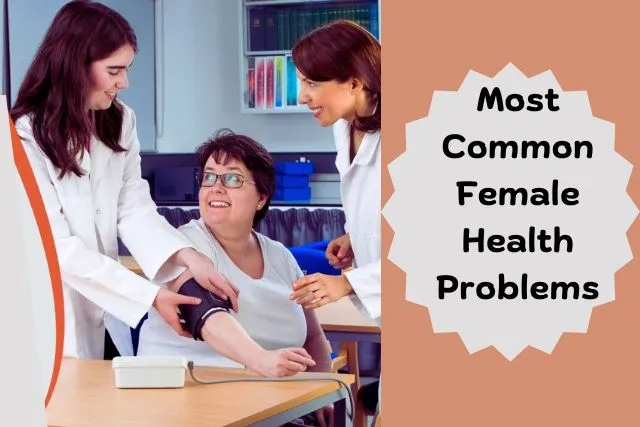Most Common Female Health Problems

The most common female health issues include breast cancer, reproductive health problems, and osteoporosis. Women also frequently encounter menstrual disorders and menopause-related complications.
Women’s health is a critical aspect of medical research and healthcare, as females face a variety of unique health challenges throughout their lives. Menstrual irregularities, such as PMS and dysmenorrhea, can disrupt daily life, while fertility issues can affect family planning.
Most Common Female Health Problems
Menopause brings its own set of concerns, from hot flashes to an increased risk of osteoporosis. Breast cancer is a prominent concern, emphasizing the importance of regular mammograms and self-exams. Additionally, conditions such as PCOS and endometriosis affect millions, often causing pain and hormonal imbalances. Addressing these health problems with preventive measures and timely medical interventions is essential to improving quality of life and promoting wellness among women worldwide. Prioritizing female-specific health education enables women to make informed decisions about their healthcare needs, ensuring a healthier future.
Recognizing Female Health Concerns
Rising awareness about female health concerns is crucial. Many health problems often affect women differently. Key issues include heart disease, breast cancer, osteoporosis, and autoimmune diseases. It is essential to recognize the unique symptoms that women experience. Better treatment and early detection may result from this.
Educational campaigns and research are vital. They help to improve understanding of women’s health issues. These efforts encourage conversations between women and healthcare providers.
Understanding gender-specific risks is also important. It supports tailored prevention strategies. For example, research shows that women are more prone to certain conditions. This includes thyroid issues and migraines. Recognizing these patterns helps in focusing healthcare efforts.
Menstrual Disorders
Menstrual disorders are a major concern for many women. Painful periods, known as dysmenorrhea, can disrupt daily activities. These periods may be accompanied by sharp, intermittent pain and a dull, continuous ache. Some women experience nausea, vomiting, headaches, or diarrhea.
Another common issue is irregular cycles, which can cause confusion. Cycles that last longer than 35 days or less than 21 days are regarded as irregular. Missing periods or cycles that vary significantly in length are signs to note. Girls whose periods are just beginning may experience irregular cycles. It usually becomes more regular over time.

Breast Health Issues
Many women face breast health issues, often starting benign. Benign conditions include cysts and fibroadenomas. These are not cancer but can cause discomfort. Women should get regular check-ups to monitor any changes. Educating oneself on symptoms and prevention is crucial.
Breast cancer remains a significant threat. It’s vital to understand risks. Family history and genetics can increase chances. Early detection through mammograms can save lives. Adopting a healthy lifestyle and avoiding known carcinogens may help lower risks. Trustworthy medical advice should guide any concerns related to breast cancer threats.
Reproductive Challenges
Polycystic Ovary Syndrome (PCOS) is a common condition among women. It affects hormones, causing irregular menstrual cycles and ovulation problems. Women with PCOS may face difficulty getting pregnant. They often have higher levels of male hormones which can cause extra body hair and acne. Managing weight and a healthy lifestyle can ease symptoms.
Endometriosis is when tissue like the womb lining grows elsewhere. It can lead to severe pelvic pain, especially during periods. Fertility issues can arise, making it hard to conceive. Treatments include hormone therapy, pain relief, and sometimes surgery. The impact of endometriosis varies with each woman.
Bone Density Concerns
Bone density is a major female health issue. As women age, their bones may get weaker. This condition is known as osteoporosis. It makes bones break easier. A lot of older women get this problem.
It is key to get enough calcium and vitamin D. These are vital for strong bones. Milk, cheese, and green leafy vegetables are full of calcium. Sunlight can give you vitamin D.
| Important Nutrient | Benefits | Good Sources |
| Calcium | Strengthens bones | Milk, Cheese |
| Vitamin D | Helps bone growth | Sunlight, Fish oils |
Girls should eat these foods from a young age. This helps avoid bone problems later. Remember, it’s never too late to start!
Heart Disease And Women
Heart disease is a leading health issue for women. Many factors can raise a woman’s risk. Smoking, high blood pressure, and diabetes are major risk factors. So are high cholesterol, being overweight, and not exercising.
Knowing the signs of heart trouble is vital. Chest pain is a common symptom. But women may have others, like feeling tired or having a stomachache. Shortness of breath and dizziness are also clues. Acting fast can save lives.
Autoimmune Diseases
Autoimmune diseases often affect more women than men. Lupus and rheumatoid arthritis are two examples. These illnesses can make the body’s immune system attack its own cells.
Many women around the world suffer from these problems. Regular check-ups can help catch them early.
Lupus signs can be rashes or feeling very tired. It can hurt joints and organs. Rheumatoid arthritis makes joints swell, feel painful, and stiff. Both can disrupt daily life.
It is important for ladies to be aware of these signs. Early treatment can make a big difference. Ladies should talk to doctors if they have such signs.
Mental Health Matters
Mental health significantly influences overall well-being. Depression and anxiety rank high among health issues that women face. Frequent mood swings, constant worry, and profound sadness can signal these conditions. Women might experience these more due to hormonal changes or societal pressures.
Eating disorders like anorexia, bulimia, and binge eating also greatly impact female health. These are complex mental health issues that affect body image and eating habits. They often require professional help and a support system for management and recovery.
Maternal Health
Pregnancy complications may include high blood pressure and gestational diabetes. These conditions demand immediate attention and careful monitoring. Women often experience morning sickness or more severe symptoms, such as hyperemesis gravidarum, which causes extreme nausea.
Postpartum issues are common and can be serious. Mood swings, depression, and anxiety often occur. Physical problems may include perineal pain, breast engorgement, and uterine infections. It’s crucial for women to seek medical care and support during this time.

Lifestyle’s Role In Female Health
Maintaining a healthy lifestyle is crucial for women’s health. Regular exercise helps to keep the body strong and diseases at bay. It can also improve mood and energy levels.
Eating the right foods is also key. Nutrients are found in fruits, vegetables, lean meats, and entire grains. These foods help to prevent common health issues.
| Food Group | Benefits |
| Fruits and Vegetables | Rich in vitamins and minerals |
| Lean Proteins | Builds muscle and repairs tissue |
| Whole Grains | Provides energy and aids digestion |
Aging And Hormonal Shifts
As women age, their bodies go through many changes. Menopause is a significant change. It typically occurs in the age range of 45 to 55. During menopause, women stop having periods.
This change means their bodies make fewer hormones like estrogen and progesterone. Low hormone levels can lead to hot flashes, night sweats, and trouble sleeping. Some women may feel sad or irritable too.
Many women choose Hormone Replacement Therapy (HRT) to ease these symptoms. HRT can add back hormones their bodies no longer make. It can help with hot flashes and protect bones. Yet, HRT may not be safe for all women. It’s vital to talk with a doctor before starting HRT.
Preventive Measures And Screenings
Maintaining good female health is critical. Every woman should embrace regular health screenings. These are key in catching issues early. Health professionals often suggest yearly check-ups. These should include blood pressure, cholesterol, and diabetes screenings.
Self-examination is another vital habit. Ladies should perform monthly breast self-exams. Look for new bumps or changes. Skin exams are important too. Search for new moles or growths. Schedule a doctor visit if anything seems strange.
Lastly, pelvic exams and Pap smears are crucial. They should start in late adolescence. Regular tests can prevent cervical cancer. It is advised to follow your doctor’s schedule for these.
Advancements In Women’s Healthcare
Women’s healthcare has seen remarkable advancements. In the area of breast cancer, there is a new, less invasive treatment showing promise. 3D mammography increases detection rates.
For reproductive health, innovative fertility treatments have emerged. Scientists have developed safer IVF protocols with higher success rates. Uterine transplants have become a reality, providing hope for those previously unable to conceive.
Research in heart disease, often overlooked in women, has gained traction. New gender-specific drug therapies address female physiology. Smart health wearables now monitor cardiac function, alerting users to potential issues. These advancements promise brighter future prospects for female health.
Frequently Asked Questions
What Is The Most Common Disorders In Females?
The most common disorders in females include anxiety, depression, and reproductive-related conditions, such as menstrual irregularities and polycystic ovary syndrome (PCOS).
What Are 8 Female Health Concerns?
Eight key female health concerns include breast cancer, ovarian and cervical cancers, reproductive health issues, menopause symptoms, osteoporosis, heart disease, and autoimmune diseases.
What Are The Top 10 Most Common Health Problems?
The top 10 most common health problems include heart disease, stroke, cancer, diabetes, obesity, chronic respiratory diseases, arthritis, depression, high blood pressure, and Alzheimer’s disease.
What Are The 3 Biggest Health Problems?
The three biggest health problems globally are heart disease, cancer, and respiratory diseases. These conditions lead to high mortality rates and require significant medical attention and lifestyle changes to manage.
Conclusion
Recognizing common female health issues is vital. Tackling them early can lead to better outcomes. Remember to consult healthcare experts for proper guidance. Maintain awareness and take initiative when it comes to your health. Embrace a balanced lifestyle for lasting health.





